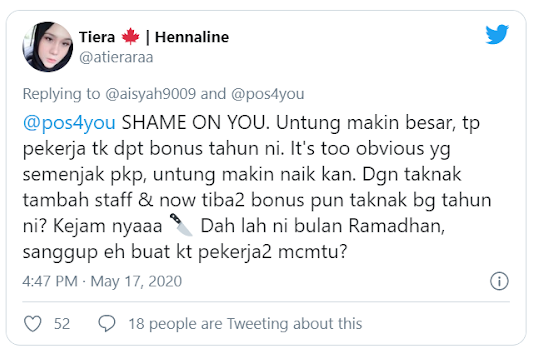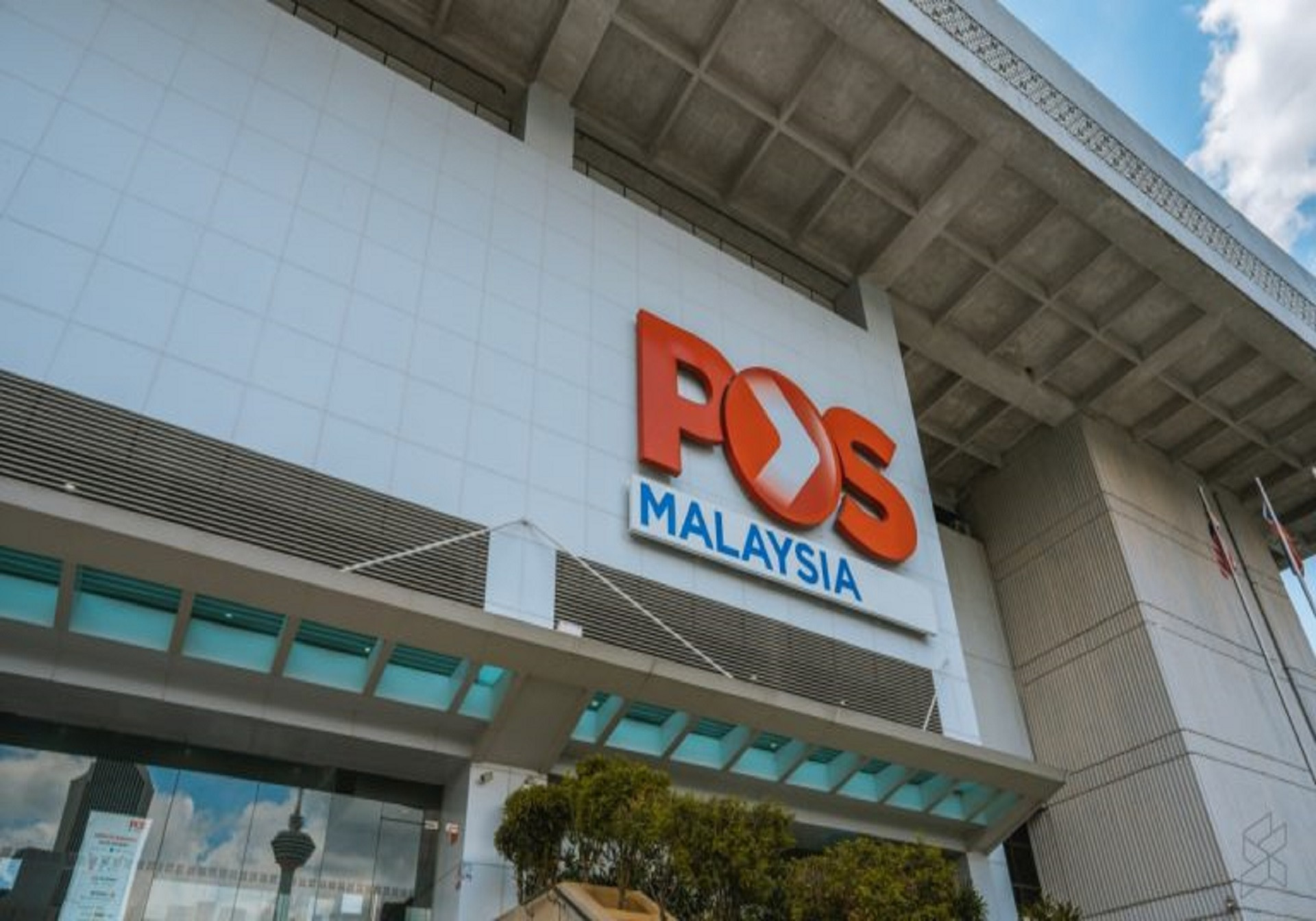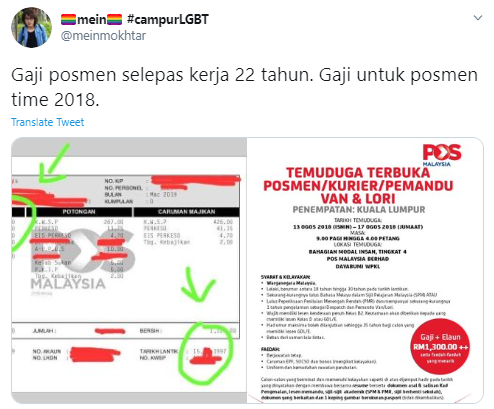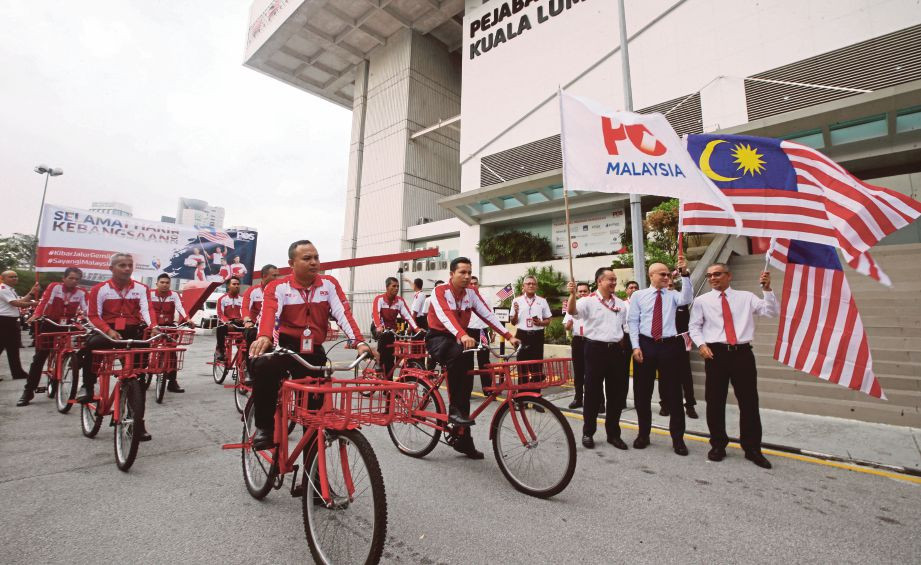A PR Disaster: How Pos Malaysia Could’ve Done Better
A change is needed to regain the trust of the people

Cover image via The Star
On top of the global Covid-19 pandemic, Pos Malaysia has been hit by a series of challenges in the first half of 2020, especially during and after the MCO.
In May, the nation’s largest network courier came under fire after a story about Pos Laju delivery riders who will not be receiving their bonuses this year despite being overworked during MCO circulated the social media.
Netizens voiced their discontent on the internet about the unfair treatment by Pos Malaysia towards their riders.

“Your profit has been increasing, yet your workers won’t be getting bonuses this year. It’s too obvious that since MCO, your revenue is increasing. You refuse to hire more staff, and now you don’t even want to pay their yearly bonuses? How cruel. How could you treat your staff this way, especially in the month of Ramadhan?”
In a more recent issue, on the 22nd June 2020, Pos Malaysia’s official Twitter account (@pos4you) tweeted an announcement about their difficulty in handling a surge of parcel volume:

“In view of the above, there are potential delays in parcel deliveries during this time. Rest assured that we are working tirelessly to maximise our capacity, to ensure deliveries are carried out as soon as possible,” Pos Malaysia wrote in a statement.
As the pandemic has forced us into living in a new normal, more people would rely on e-commerce to buy what they want or send items to other people.
Hence, as you guessed it, the tweet was flooded with discontent from users questioning the quality of the postal service and calling for better solutions and change.
 Image via Soya Cincau
Image via Soya Cincau
From the perspective of an agency, it’s undeniable that Pos Malaysia has landed themselves in a snowball avalanche of PR disasters due to them not addressing the issues well and not being proactive.
Here’s how we think they could’ve handled their PR comms better:
- Be timely with their response
The first step to handling a crisis is to respond to the issue immediately. The Internet and social media are all about information shared at lightning speed.
Experienced PR professionals know that news can break within seconds, which is why it is important to have a crisis management plan in place that’s ready to be implemented in case something happens.

According to Twitter user @nbk7590, Pos Malaysia’s statement release came a few months late as customer complaints had already been piling up even months before.
Be it an apology, clarification or a statement, companies must spare no extra time to address it, as every moment waited is a moment wasted to salvage your reputation and credibility.
The user also made a good point by suggesting that Pos Malaysia should save their apology, and instead “show it through ACTION”.
In any PR crisis, a follow-up action to rectify an issue is just as important, if not more, as the statement’s ‘promises’. This brings us to the next point:
- Follow-up with real change
Pos Malaysia’s reputation has been on the down-low for months, and their latest official statement hasn’t done them any good.
If they are interested in regaining the people’s trust at all, serious actions need to be taken, and they need to be communicated effectively.
For one, they could pledge to increase their quality of service by first expanding their manpower.
Hiring more employees doesn’t only alleviate the workloads of their already-overworked staff, but it can also be an important part of economic stimulus during the post-pandemic period where unemployment will reach record-high.

A Twitter user also suggested that Pos Malaysia should pay their employees better to encourage more applicants into their workforce, and offer them more perks!
However, we still think that the issue of manpower and wage are only the tip of the iceberg. For real change to happen, the organisation needs to identify the real problems within their system, and to rectify them immediately.
With a worsening economic situation caused by Covid-19 and rise in the number of capable competitors such as Lalamove, City-Link and Ninja Van, Pos Malaysia needs to step up its game.
- Go the extra mile
Since the MCO started, there had been a spate of pay cuts by CEOs and business leaders aimed to mitigate the impact of Covid-19 by preserving cash flow.
Pay cuts demonstrate a good sign of leadership from the management as it can protect their organization and employees by preserving cash flow and preventing layoffs.
If only Pos Malaysia would join in on this pay cut trend (and they really should!), considering it was revealed how much the top management gets paid versus their delivery riders.

“In 2019, Pos Malaysia paid RM989,577.21 in fees and allowance to the board of directors,” Twitter user @datukhensem revealed. “Besides that, a senior management personnel in Pos Malaysia received around RM1.15 - RM 1.2 million a year in salary, bonus, allowance etc.”
This revelation didn’t sit well with Twitter users, with many pointing out the unfair divide between the working class and the higher-ups.
In comparison, another Twitter user posted the salary of a Pos Laju postman (basic salary of about RM 1,800) with 22 years of work experience.

To our knowledge, Pos Malaysia did not respond to any of these revelations.
But it’s clear that an internal reform needs to be carried out.
To restore their once-held reputation, Pos Malaysia needs to prove that they have their employees’ best interests at heart.
One of the solutions we can think of? They could start by announcing pay cuts across their top management in order to compensate their employees well for the hard work.
They also need to be more understanding of their situation and take immediate action whenever issues arise.
At the end of the day, handling a PR crisis involves showing that you care about your own people and the business, and communicating your plans to achieve betterment to your customers and stakeholders.
Regardless, we really hope that Pos Malaysia could get their act together by improving their service and protecting the welfare of their employees.
They are after an inseparable part of our national identity.
 Image via Harian Metro
Image via Harian Metro


